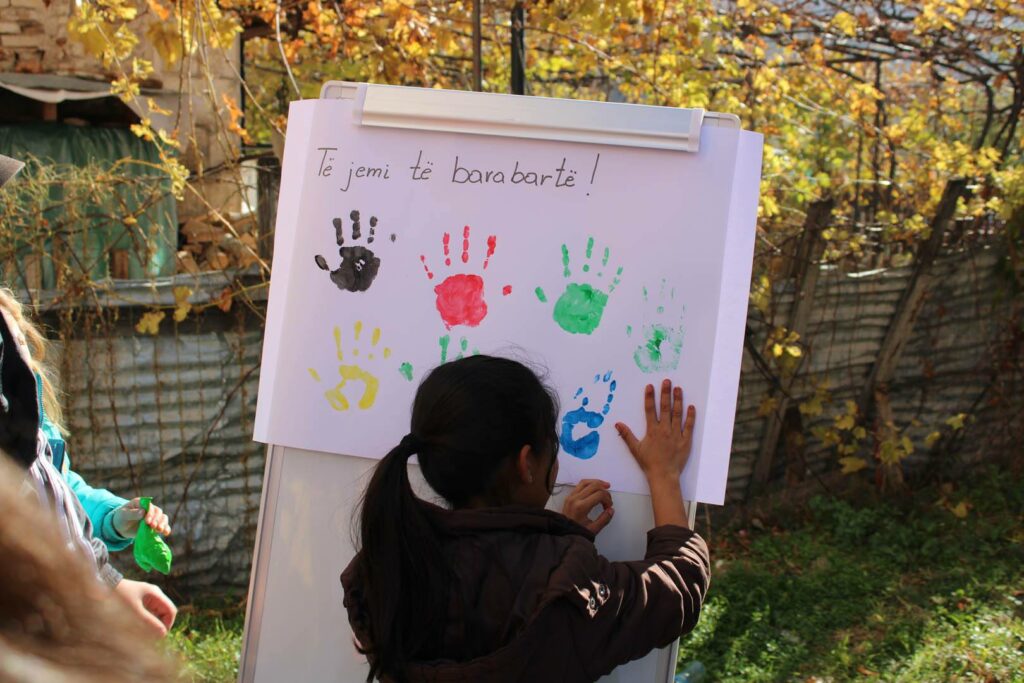Social Mobilisation and Local Enterpreneurship Support – SMILES programme
The SMILES programme provides an integrated approach to improve the well-being of people in vulnerable circumstances in Tropoja and Puke, Albania.
The programme is based on two Dorcas concepts, namely Social Empowerment and Protection (SEP) and Inclusive Entrepreneurship (IE). As such, the social and economic development components of the SMILES programme complement and reinforce each other.
Tropoja and Puka share similar social and economic conditions, representing an impoverished rural and mountainous area where small-scale farming, livestock rearing and petty trade are among the main livelihood activities. Isolation, lack of government support and limited individual and organisational capacity, among other factors, have maintained a system characterised by semi-subsistence livelihoods based on traditional production methods and low revenues.
SMILES brings together a variety of actors who will not only benefit from, but also promote and contribute to the development of the local economy and tourism sector in the region, while ensuring that this is a process that is carried and led by the local community itself.
The intervention deliberately makes links with local people and their various livelihoods so that the whole area benefits, not just a privileged few. The whole process will be supported at the society level by involving actors such as local authorities, MFIs, tourism agencies and specific training institutions. In addition, security networks will be developed for the most marginalised people who struggle to provide for themselves.
Through SEP, the intervention aims to create the basis for increased cooperation and strong community structures (formal and informal groups and associations) that can play a sustainable role in the local development process. In this respect, the Asset-Based Community Development approach will be instrumental in empowering individuals and groups to identify and make use of existing assets in their communities. As part of the SEP component, Community Safety Nets will be established to take care of the most marginalised people in the community.
In the SMILES programme, social and economic empowerment go hand in hand, with the Inclusive Entrepreneurship (IE) approach ensuring that participants can take advantage of the various economic opportunities in the target area. This includes capacity building in areas such as business and marketing skills, employability skills, agriculture and livestock skills, but also activities that lead to an enabling environment for entrepreneurship (e.g. improved access to capital, improved infrastructure and simplification of rules and regulations).
The main target groups of the programme are:
Small and medium-sized farmers
Small- and medium-sized farmers want to develop their farms but lack capacity in a number of areas, including business development and management, modern production technologies and marketing skills. They also have limited access to finance to invest in their farms. The intervention will address farmers (including women) through training and mentoring, building on previous experience of the TICP programme. A revolving fund will be established as part of the programme to improve their access to investment capital.
Small guesthouse owners
The programme will provide relevant training to guesthouse owners and staff, including business development and management, customer relations, promotion, marketing and gastronomy. It will also offer financial support to develop and expand their businesses.
Income generation potential
There are a significant number of families living in poverty who are willing to improve their situation by engaging in income-generating activities. They do not have the material and financial resources, as well as the capacity to carry out income generating activities. The intervention will support urban and rural households to engage in income generating activities. Opportunities to serve the tourism market will be explored, such as the production and marketing of handmade souvenirs.
Youth and children
Through the Future for Children approach, youth and children belonging to the above-mentioned households living in poverty will participate in general life skills activities (Aflatoun), parenting and employability programmes.

Marginalised households
They have no potential for income generation and are dependent on others for support. Government economic support, which amounts to only about 8,000 ALL, and other social services are not sufficient to meet their needs. Through the establishment of CSNs, the intervention will address the basic needs of approximately 130 families (about 500 family members) by supporting them with material assistance through CSNs, health care/home visits, medicines and hygiene materials.
Older people
There is an increasing number of lonely older people, especially from remote rural areas, who have vital needs in terms of access to basic services, especially health services. They do not have the means to cope with this situation on their own. The intervention will facilitate socialisation and access to health and other services through the development of community safety nets (including volunteers and cooperation with the municipality).
Specialist medical visits will also be facilitated for emergencies. The safety nets will be maintained with the involvement of the municipality, other public institutions, businesses and individuals. The intervention will work towards the institutionalisation of the safety nets through the creation of the Social Impact Committee with representatives of key actors. It will also carry out the “Blue Bucket” campaigns to raise awareness and active participation of the community.
04 July 2024
Are you inspired?
Read the next story or contact us to get to know more about making an impact together.